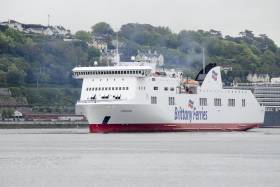Displaying items by tag: Strongest Performer
Ireland-France Route Is Strongest Performer for Brittany Ferries But Warns of Brexit on UK Services
#FerryNews- Cork-Roscoff route was the strongest performing Brittany Ferries service of the French company's network, linking the UK, France and Spain, however concerns over Brexit loom on the horizon, writes Jehan Ashmore.
Figures released by Brittany Ferries for passenger and freight figures covering quarter-three period (July-Sept) 2018 show an encouraging season. During the 3-month period, passengers figures on the Ireland-France route for 2017 was 44,744 and this compared to this year with 48,700 (an increase of 9 per cent).
The rise in passengers is reflected through the introduction in May of additional capacity following the debut of the chartered-ropax, Connemara on the Ireland-France route but also on the new first ever 'direct' Ireland-Spain link between Cork and Santander.
On the UK, Spain and Ireland routes, there were 127,434 passengers in 2017 and for this season the figure reached 142,108 a rise of 12% on these long-haul routes, again due to the contribution of Connemara.
Overall passenger numbers on Brittany Ferries routes over the summer season were also up 2pc to 1,078,507 compared to the same period last year.
In terms of freight figures, Brittany Ferries have published an overall total for all routes (and likewise of passengers, it is for the same timeframe). Total freight carried in 2017 was 47,815 while for this season the number was marginally down at 45,649. A difference of -5 per cent.
Brittany Ferries which uses three UK English Channel ports (Portsmouth, Poole and Plymouth) is where 85 per cent of the ferry firm's passengers are UK holidaymakers visiting key regions in France and northern Spain.
In recent months, Brittany Ferries announced a total €450m investment in three new ships post-Brexit on UK-France-Spain services (firstly next year, LPG fuelled Honfleur followed by a pair of Stena E-Flexers), however they also raised an alarm. This is from a fall in demand for family holidays next summer, which Brittany Ferries has warned of serious consequences for international tourism and the regions it serves if a Brexit deal does not bring certainty and the free movement across borders enjoyed by customers today.
Roll back to more than four decades when the origins of Brittany Ferries arose from Breton farmers wanting to export vegatables to new markets in the UK, which would lead to the formation of the largest ferry operator currently on the English Channel. The company, Bretagne-Angleterre-Irlande (B.A.I) otherwise as we know as Brittany Ferries was founded by Alexis Gourvennec who strove to enrich Brittany for the benefit of its citizens.
Since Brittany Ferries first sailing took place in 2 February 1973, the day after the UK (along with Ireland and Denmark) joined the European Economic Community (forerunner to the EU), the French operator has grown into a multi-national operation whose biggest export region is British tourists.
The launch earlier this year of the new Ireland-Spain service has opened up opportunities not just for tourists but also freight-hauliers. In addition to increasing cultural Celtic connections with the Iberian peninsula.






























































